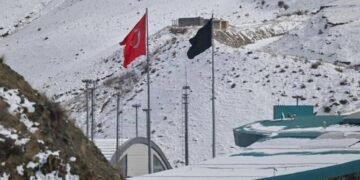CARACAS, Venezuela (news agencies) — Venezuelan President Nicolás Maduro was sworn in for a third six-year term Friday despite international condemnation of his recent reelection as illegitimate, as his administration grows increasingly brazen in cracking down on opponents.
While his supporters are expected to rally, it is unclear whether opponents will head to the streets after aides to a key opposition leader said she was briefly detained Thursday following an anti-government demonstration in the capital, Caracas.
Here’s the latest:
Standing before officials, Maduro was sworn in at Venezuela’s legislative palace.
“I swear by Bolivar, by Sucre, by Urdaneta, by Manuela Saez, by the eternal memory of our eternal commander Hugo Chavez … I swear by history, I swear by my life,” Maduro said.
As he did, followers erupted into cheers.
Authorities announced the arrival of Maduro and other leaders to Venezuela’s legislative palace, where he is set to be sworn in shortly.
The building is being heavily guarded by police, military and intelligence officers. In adjacent streets and a nearby plaza, people, many sporting pro-Maduro T-shirts, are already gathering. Maduro walked by crowds as some outside the palace roared “Vamos Nico!”, “or Let’s go, Nico!”
“Today we’ve come to support our constitutional President Nicolás Maduro with tons of joy and excitement,” said supporter Sabrina Sucre, who traveled from the Venezuelan coast with a fellow fisherwoman to witness the inauguration.
The European Union imposed sanctions on 15 top Venezuelan officials who had a role in the South American country’s 2024 election.
Among those sanctioned are the president and vice president of Venezuela’s Supreme Court, electoral agency and others, which the 27-nation bloc said have put the nation’s democracy at risk.
Venezuelan authorities have announced the suspension of commercial flights and the closure of borders between Venezuela and Colombia, a country with which it shares a 2,200-kilometer (1,367-mile) border.
The measure, which came into effect at 5 a.m. Friday local time and will last 72 hours, came after former opposition presidential candidate Edmundo González promised to return to the country to be sworn in as president..
González, who returned to Latin America last weekend from his self-exile in Madrid, is recognized as president-elect by the United States, several countries in the region and international organizations such as the Organization of American States. He hasn’t offered details of how he intends to enter the country to appear at the inauguration and strip Maduro of power.
Costa Rica’s former President Laura Chinchilla — part of the delegation of former leaders accompanying González — said Thursday he was still intending to enter Venezuela on Friday, without providing details. She spoke at the hotel in the Dominican Republic where they were staying.
Maduro is facing more international rebuke than at any time in his nearly 12 years in power. The self-declared socialist has clung to power despite credible evidence that he lost last year’s election by a landslide. That sparked criticism by the United States and others that the vote was stolen.
But this isn’t the first time Maduro’s claim to power has been questioned. Dozens of countries led by the U.S. condemned his 2018 re-election as a sham and recognized Juan Guaidó, the then-head of the National Assembly, as Venezuela’s legitimate leader.
The opposition leader even led a parallel government for a few years, bolstered by the Donald Trump administration’s “maximum pressure” campaign of punishing economic sanctions, and until the emergence of the coronavirus pandemic, repeatedly commandeered massive anti-Maduro protests. The anti-Maduro sentiment stemmed from the political, social and economic crisis that pushed millions into poverty, hunger, poor health, crime, desperation and migration.
Maduro, who took power in 2013 following Hugo Chávez’s death from cancer, has seen the entirety of his time in office marked by the crisis. Without “El Comandante” in charge, the economy entered a death spiral — shrinking 71% from 2012 to 2020, with inflation topping 130,000%.
Ahead of last year’s election, voters across the country repeatedly said they or their loved ones would emigrate if Maduro remained in power. Under his watch, more than 7.7 million Venezuelans have already left their homeland in search of better living conditions.


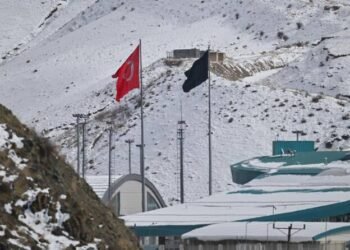


 United Arab Emirates Dirham Exchange Rate
United Arab Emirates Dirham Exchange Rate